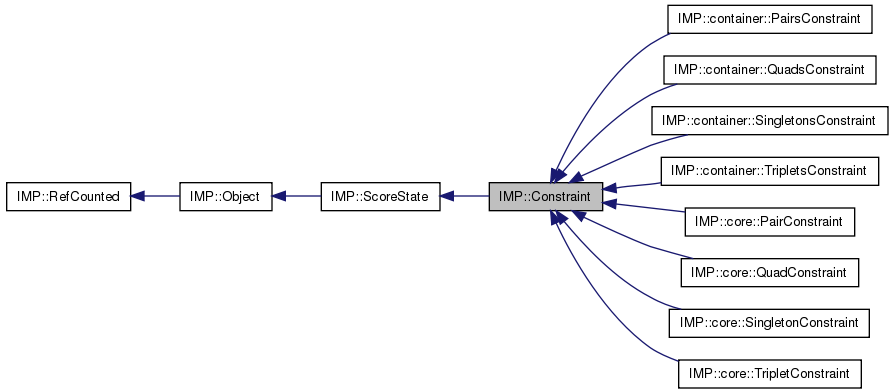IMP::Constraint Class Reference
Detailed Description
Implement a constraint on the
Model.
The solution model can be restricted two ways, either by penalizing "bad" conformations (a restraint) or by forcing some set of attributes to a function of other attributes (a constraint). For example, rigid bodies consisting of a number of particles could be implemented either way.
- As a restraint: the particles in the rigid body are each moved independently by the optimizer. The scoring function has a term for how far each particle diverges from its rigid position.
- As a constraint: the optimizer only changes the position of the rigid body itself and the position of the particles in the body are computed from the position of the rigid body.
In IMP, constraints are implemented as a type of ScoreState. Before evaluation, the constraint updates the attributes of some of the particles to ensure that the constraint is satisfied. Since this update creates implicit relationships between the particles, after the derivatives are computed, the constraint can move them around to make sure the derivatives of the optimizer parameters are correct.
In general, constraints are associated with Decorator objects and created invisibly when needed.
- Note:
- Constraint invariants will not necessarily hold if involved particles have been called and Model::evaluate() has not been called. For example, if you change a particle's coordinates, a IMP::core::Centroid of a set containing the particle will not be correct until the Model is evaluated.
- Implementors
- Developers who wish to implement a Constraint should inherit from this class and use the IMP_CONSTRAINT() macro to help define the needed functions. Lamentably, we do not provide an example.
|
Public Member Functions |
|
| Constraint (std::string name=std::string()) |
Friends |
|
template<class T > |
| void | IMP::internal::unref (T *) |
The documentation for this class was generated from the following files:
